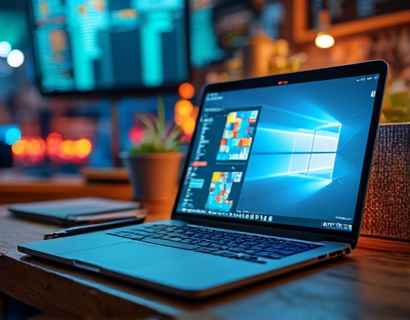Decentralized File Management: Revolutionizing Business Collaboration
In the digital age, efficient and secure file management has become a cornerstone for business collaboration and productivity. Traditional centralized file management systems often face challenges such as single points of failure, security vulnerabilities, and inefficiencies in access control. An innovative approach to addressing these issues is the adoption of decentralized file management solutions. This article delves into the benefits and workings of decentralized file management platforms, highlighting how they can optimize business collaboration by providing a secure, efficient, and user-friendly online environment for teams.
Understanding Decentralized File Management
Decentralized file management refers to a system where data is not stored in a single central location but is distributed across multiple nodes in a network. This approach leverages blockchain technology and peer-to-peer networking to ensure that files are stored and accessed in a manner that is both secure and resilient. Unlike traditional centralized systems, decentralized platforms eliminate the risk of data being compromised or lost due to a single point of failure.
The core principle behind decentralized file management is the distribution of data across a network of computers, each acting as a node. These nodes collectively maintain the integrity and availability of the data. When a file is uploaded to the network, it is broken down into smaller chunks, each of which is encrypted and stored on multiple nodes. This not only enhances security but also improves data retrieval speeds, as requests can be served from the nearest available node.
Enhanced Security Features
Security is a paramount concern for any file management system, especially in a business environment where sensitive information is frequently handled. Decentralized platforms offer several security advantages over traditional centralized systems.
Firstly, the distributed nature of the network means that there is no single point of attack. Even if one node is compromised, the overall system remains secure as the data is replicated across multiple nodes. This redundancy ensures that files are not lost and remain accessible to authorized users.
Secondly, encryption plays a crucial role in maintaining data privacy. Files are encrypted before being split and distributed across the network. Only users with the correct decryption keys can access the data, ensuring that unauthorized individuals cannot intercept or read the files.
Additionally, decentralized platforms often implement advanced access control mechanisms. These mechanisms allow administrators to define granular permissions for different users or groups, ensuring that only authorized personnel can access specific files or folders. This level of control minimizes the risk of data breaches and unauthorized access.
Improved Collaboration and Productivity
One of the most significant benefits of decentralized file management is the enhancement of collaboration and productivity within teams. Traditional centralized systems can become bottlenecks, especially when multiple users need to access and edit files simultaneously. Decentralized platforms overcome these limitations by providing a seamless and efficient collaborative environment.
With a decentralized platform, team members can access and work on files in real-time, regardless of their physical location. The distributed network ensures low latency and high availability, making it ideal for global teams. Moreover, the platform's user-friendly interface simplifies the process of sharing and collaborating on files, reducing the time spent on administrative tasks.
Version control is another critical aspect of collaboration. Decentralized platforms automatically track changes made to files, allowing users to view and revert to previous versions if necessary. This feature not only enhances the accuracy of collaborative work but also fosters a culture of accountability and transparency within teams.
Scalability and Cost Efficiency
Scalability is a key consideration for businesses as they grow and evolve. Decentralized file management platforms excel in this area, offering a scalable solution that can accommodate increasing data volumes and user bases without compromising performance.
Unlike traditional centralized systems, which require significant infrastructure investments to scale, decentralized platforms can easily handle growth by adding more nodes to the network. This horizontal scaling approach is not only cost-effective but also environmentally friendly, as it reduces the need for extensive hardware resources.
Cost efficiency is another advantage. Decentralized platforms often operate on a peer-to-peer model, where the cost of storage and bandwidth is distributed among network participants. This shared responsibility model can lead to substantial cost savings compared to the high expenses associated with maintaining large centralized servers.
User Experience and Accessibility
A critical factor in the success of any file management solution is the user experience. Decentralized platforms are designed with the end-user in mind, focusing on simplicity, accessibility, and ease of use.
The user interface of a decentralized file management platform is intuitive and straightforward, allowing users to upload, share, and collaborate on files with minimal training. The platform supports various file types and sizes, ensuring that all data can be seamlessly integrated into the system.
Accessibility is also a key feature. Users can access files from any device with an internet connection, making it ideal for remote and hybrid work environments. The platform's compatibility with different operating systems and devices ensures a consistent experience across all user endpoints.
Case Studies and Real-World Applications
To better understand the practical benefits of decentralized file management, let's explore a few real-world applications and case studies.
One notable example is a multinational corporation that adopted a decentralized file management platform to streamline its global operations. Prior to implementing the solution, the company faced challenges with data synchronization and security across its various branches. The decentralized platform provided a unified and secure repository for all company files, enabling seamless collaboration among teams in different regions. The result was a significant reduction in project delays and a marked improvement in data integrity.
Another case study involves a group of independent freelancers and small businesses that formed a cooperative to manage their shared resources and projects. By using a decentralized file management platform, they were able to create a trustless environment where each member could contribute and access files without the need for a central authority. This not only enhanced collaboration but also built a sense of community and shared responsibility among the members.
Future Trends and Innovations
The landscape of decentralized file management is rapidly evolving, with ongoing innovations set to further enhance its capabilities and adoption.
One emerging trend is the integration of artificial intelligence (AI) and machine learning (ML) into decentralized platforms. AI can be used to optimize data storage and retrieval processes, predict user behavior, and enhance security measures. For instance, AI-driven analytics can help identify patterns in file access and usage, enabling more efficient resource allocation and improved user experiences.
Another area of innovation is the development of interoperable decentralized networks. As more platforms adopt standardized protocols, it becomes easier for users to seamlessly transfer files and collaborate across different decentralized systems. This interoperability will foster a more connected and cohesive decentralized ecosystem, benefiting businesses and individuals alike.
Conclusion
Decentralized file management represents a transformative shift in how businesses and teams handle file storage, access, and collaboration. By leveraging the power of blockchain and peer-to-peer networking, these platforms offer enhanced security, improved collaboration, scalability, and cost efficiency. As the technology continues to mature, we can expect to see even more innovative applications and wider adoption across various industries. Embracing decentralized file management is not just a strategic move but a necessary step towards a more secure, efficient, and collaborative future.











































